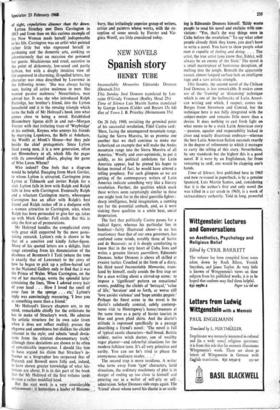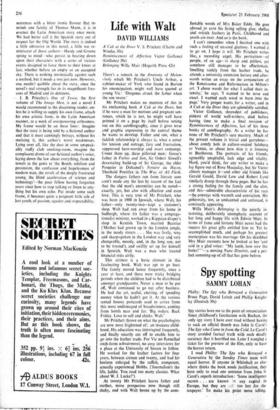NEW NOVELS
Spanish story
HENRY TUBE
Inconsolable Memories Edmundo Desnoes (Deutsch 21s)
This Sunday Jose Donoso translated by Lor- raine O'Grady Freeman (Bodley Head 25s) Time of Silence Luis Martin Santos translated by George Leeson (Calder and Boyars 13s 6d) Out of Town J. B. Priestley (Heinemann 35s)
On 26 July 1960, revisiting the germinal point of his successful revolution, Fidel Castro said: `Here, facing the unconquered mountain range, facing the Sierra Maestra, let us promise one another that we shall continue to make our fatherland an example that will make the Andes mountain range into the Sierra Maestra of all America.' Woolly and over-optimistic, to put it mildly, as his political ambitions for Latin America appear, had he pinned his hopes to fiction instead of fact, he would have uttered a telling prophecy. For such glimpses as we are getting of the contemporary writers of Latin America indicate something very like a literary revolution. Further, the qualities which mark these writers seem surprisingly similar to those one might look for in the ideal guerrilla fighter: sharp intelligence, bold imagination, a cunning eye for the potential ambush, and, as it were stoking these qualities to a white heat, social desperation.
The fact that politically Castro passes for a radical figure, whereas his particular line in bombast—fairly illustrated above—is no less reactionary than that of our own governors, has confused some minds, notably those of Sartre and de Beauvoir; so it is deeply comforting to know that in the very heart of Cuba lives and writes a genuine literary guerrillero, Edmundo Desnoes. Senor Desnoes is above all skilled at evasive tactics. Couched in the form of a diary, his third novel Inconsolable Memories, trans- lated by himself, easily avoids the first trap set for a man writing about a stirred-up scene: to impose a 'significant' pattern on sensational events, peddling the cliches of `betrayal,' value of life,' heroism' and so forth, or worse still 'love amidst violence' and 'hope amidst despair.' Perhaps the finest scene in the novel is the diarist's subduedly comical, subtly contemp- tuous visit to Hemingway's house/museum at the same time as a party of Soviet tourists in blue and green plaid shirts. And the diarist's attitude is expressed specifically in a passage describing a friend's novel: 'The novel is full of typical exotic characters—half-breed, Batista soldier, native witch doctor, son of wealthy sugar planter—and colourful situations for the modern folklore taste. It's all very primitive and earthy. You can see he's tried to please the anonymous mediocre reader. . .
The second trap is more insidious. A writer who turns away from 'type' characters, lurid situations, the ordinary machinery of plot is in danger of ending up too close to himself and petering out in a welter of self-pity or self- admiration. Senor Desnoes side-steps again. The `friend' about whose novel his diarist is so scath- leg is Edmundo Desnoes himself. 'Eddy wants people to read his novel and exclaim with con- viction: "Yes, that's the way things were in Cuba before the revolution." To say what other people already think they know, you don't have to write a novel. You have to show people what man is capable of feeling and doing. . . . The artist, the true artist (you know that, Eddy), will always be an enemy of the State.' The novel is a small masterpiece of humorous deception, of melting into the jungle. Beneath the apparently casual, almost languid surface lurk an intelligent rage and a rare artistic strength.
This Sunday. the second novel of the Chilean, Jose Donoso, is less remarkable. It makes some use of the 'framing' or 'distancing' technique which is one of the hallmarks of Latin Ameri- can writing and which, I suspect, comes via Borges from Stevenson and Conrad, but the technique here is not fully integrated with the subject-matter and remains little more than a device. It does nothing to cast fresh light on what seems to be a stock Latin American story —passion, squalor and respectability locked in close and usually disastrous embrace—whereas the best Latin American fiction succeeds exactly in the degree of refinement to which it manages to carry the telling of this story. Nevertheless, by any standards but the highest this is a good novel. If it were by an Englishman, far from venturing to sniff, one would be clapping one's hands.
Time of Silence, first published here in 1965 and now re-issued in paperback, is by a genuine Spaniard, Luis Martin Santos, and, considering that it is the author's first and only novel (he was killed in a car crash in 1963), is a work of extraordinary authority. Told in long, powerful sentences with a bitter ironic flavour that re- minds one faintly of Thomas Mann, it, is in essence the Latin American story once more. We had better call it the Spanish story out of respect for the Old World. The story is indeed a little obtrusive in this novel, a little too re- miniscent of those authors—Hardy and Greene spring to mind—who persist in bearing down upon their characters with a series of vicious events designed to force them to their knees at last, whether before an empty or an occupied sky. There is nothing intrinsically against.such a method, but it needs a rest just now. However, one needn't quibble about the story, since the novel's real strength lies in its magnificent fres- coes of Madrid and its denizens.
J. B. Priestley's Out of Town, the first volume of The Image Men, is not a novel I would recommend to the discerning reader, un- less he is willing to supply his own frame, attach his own artistic form, in the Latin American manner, to a work of overpowering artlessness. My frame would be on these lines: imagine that the story is being told by a fictional author and that it most cunningly betrays, without his realising it, this author's worst weaknesses. Lying over all, like the dust in some unspeak- ably stuffy club smoking-room, imagine the complacent drone of our fictional author's voice, laying down the law about everything, from the towels in the gents to 'the Bomb, nihilism and pessimism, the confusion and hopelessness of modern man, the revolt of the deeply frustrated young, the blind acceleration of science and technology'—the poor fellow having forgotten years since how to stop talking or listen to any- thing but his own echo. Put inside some such frame, it becomes quite a poignant little tale of lost youth, of passion, squalor and respectability.



































 Previous page
Previous page